How to use the COMBINA function
What is the COMBINA function?
The COMBINA function calculates the number of combinations with repetition for a given number of elements from a larger group of elements. The COMBINA function was introduced in Excel 2013.
Table of Contents
1. Introduction
What is a combination?
A combination is a way of selecting items from a collection where the order of selection does not matter.
For example, if you have three fruits, say an apple, an orange, and a pear. There are three combinations of two that can be drawn from this set:
- apple and a pear
- apple and an orange
- pear and an orange
What is the name if the order of selection matter?
Permutation. An example are digits in a phone number, the order is very important or you will call the wrong number.
What is repetition allowed?
Repetition allowed is when there can be duplicate values.
What is an element?
An element refers to an item which can be anything.
What is the difference between the COMBIN function and the COMBINA function?
The difference is that COMBIN counts the number of combinations without repetitions, while COMBINA counts the number of combinations with repetitions.
For example, if you have three items A, B, and C, and you want to choose two of them:
- COMBIN will give you three possible combinations: AB, AC, and BC.
- COMBINA will give you six possible combinations: AA, AB, AC, BB, BC, and CC.
Explain what permutation is?
A permutation is a way of arranging a set of elements in a specific order. For example, if you have three letters A, B, and C, you can arrange them in six different ways: ABC, ACB, BAC, BCA, CAB, and CBA.
Each of these arrangements is called a permutation of the three letters. The order of the objects matters in a permutation, so ABC and BAC are considered different permutations.
The PERMUT and PERMUTA function are in the Statistical category
What is the formula behind the COMBINA function?
nCr (with repetition) = (n+r-1)! / (r! * (n-1)!)
- n is the total number of items
- r is the number of items being chosen
What is the difference between combination and permutation?
- The order of the objects matters in a permutation, so ABC and BAC are considered different permutations.
- ABC and BAC are considered the same combination because the order doesn't matter.
2. Syntax
COMBINA(number, number_chosen)
| number | Required. A number greater than or equal to zero and greater than or equal to Number_chosen. |
| number_chosen | Required. A number greater than or equal to 0. |
3. Example 1
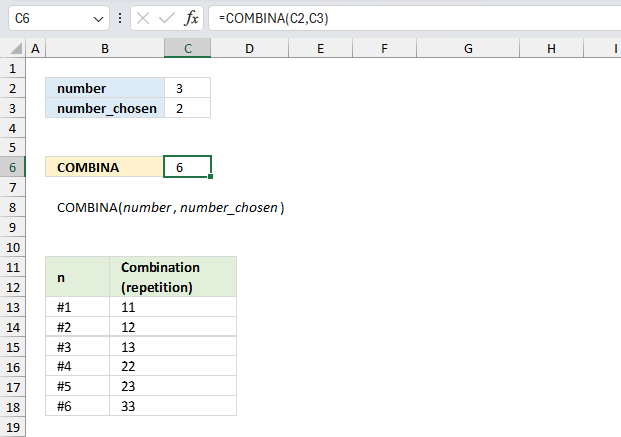
How many different combinations are possible if you can pick two items from a group of three different items? Repetition is allowed.
Here are the arguments:
- number: 3
- number_chosen: 2
Formula in cell D3:
The formula returns 6 different combinations. If we name each item from 1 to 3 we can display the different possible combinations based on 2 items out of 3 with repetition allowed.
Cell range C13:C18 shows these different combinations in the image above, they are:
| n | Combination (repetition) |
| #1 | 11 |
| #2 | 12 |
| #3 | 13 |
| #4 | 22 |
| #5 | 23 |
| #6 | 33 |
The math formula behind the COMBINA function is:
Combinations (with repetition) = (n+r-1)! / (r! * (n-1)!)
- n is the total number of items. In this example: 3
- r is the number of items being chosen. In this example: 2
Lets use the provided values in the question to calculate the number of combinations manually.
(n+r-1)! / (r! * (n-1)!)
=(3+2-1)! / (2!*(3-1)!)
=4!/4
=4*3*2*1/4
=24/4
=6
The math formula calculates the number of combinations to 6 which matches the value in cell C6.
4. Example 2
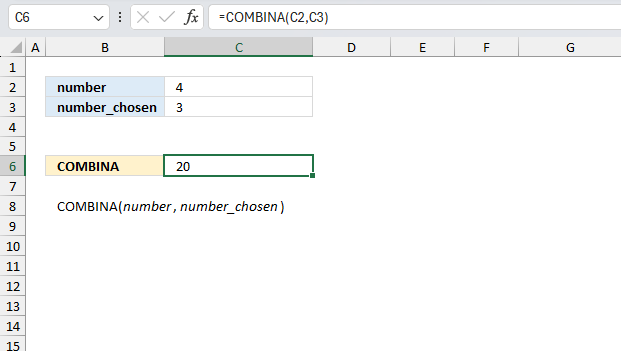
You have 4 different types of fruits and want to make a fruit salad with 3 fruits. If you can use the same fruit more than once, how many different combinations are possible?
Here are the arguments:
- number: 4
- number_chosen: 3
Formula in cell D3:
The formula returns 20 different combinations of fruits in the salad, repetition is allowed.
The math formula behind the COMBINA function is:
Combinations (with repetition) = (n+r-1)! / (r! * (n-1)!)
- n is the total number of items. In this example: 4
- r is the number of items being chosen. In this example: 3
Lets use the provided values in the question to calculate the number of combinations manually.
(n+r-1)! / (r! * (n-1)!)
=(4+3-1)! / (3!*(4-1)!)
=6!/(6*6)
=6*5*4*3*2*1/36
=720/36
=20
The math formula calculates the number of combinations to 20 which matches the value in cell C6.
5. Example 3
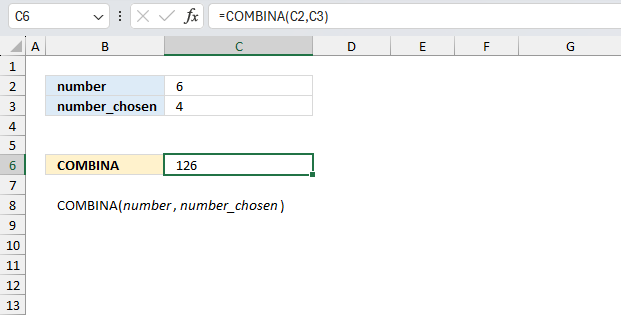
In a game, you need to pick 4 numbers from 1 to 6. Numbers can be repeated. How many different combinations are possible?
Here are the arguments:
- number: 6
- number_chosen: 4
Formula in cell D3:
The formula returns 126 different combinations of numbers, repetition is allowed.
The math formula behind the COMBINA function is:
Combinations (with repetition) = (n+r-1)! / (r! * (n-1)!)
- n is the total number of items. In this example: 6
- r is the number of items being chosen. In this example: 4
Lets use the provided values in the question to calculate the number of combinations manually.
(n+r-1)! / (r! * (n-1)!)
=(6+4-1)! / (4!*(6-1)!)
=9!/(4!*5!)
=(9*8*7*6*5*4*3*2*1)/(4*3*2*1*5*4*3*2*1)
=362880/2880
=121
The math formula calculates the number of combinations to 121 which matches the value in cell C6.
6. Example 4
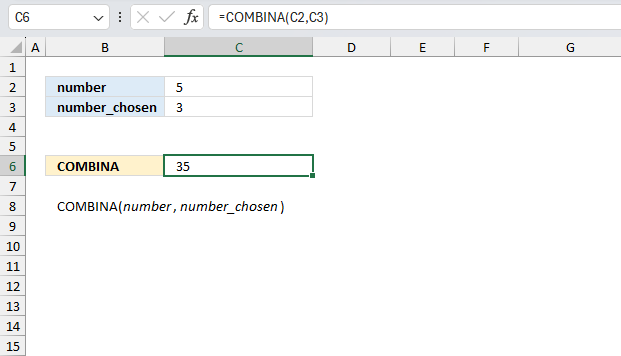
A restaurant offers 5 different toppings for pizza. If you want to order a pizza with 3 toppings, in how many different ways can you choose the toppings if the order of the toppings doesn't matter?
Here are the arguments:
- number: 5
- number_chosen: 3
Formula in cell D3:
The formula returns 35 different combinations of numbers, repetition is allowed.
The math formula behind the COMBINA function is:
Combinations (with repetition) = (n+r-1)! / (r! * (n-1)!)
- n is the total number of items. In this example: 5
- r is the number of items being chosen. In this example: 3
Lets use the provided values in the question to calculate the number of combinations manually.
(n+r-1)! / (r! * (n-1)!)
=(5+3-1)! / (3!*(5-1)!)
=7!/(3*2*4*3*2)
=(7*6*5*4*3*2*1)/()
=5040/144
=35
The math formula calculates the number of combinations to 35 which also matches the value in cell C6.
7. Function not working

COMBINA returns the #NUM! error value if the value of either argument is outside of its constraints.
COMBINA returns the #VALUE! error value if either argument is a non-numeric value.
7.1 Troubleshooting the error value

When you encounter an error value in a cell a warning symbol appears, displayed in the image above. Press with mouse on it to see a pop-up menu that lets you get more information about the error.
- The first line describes the error if you press with left mouse button on it.
- The second line opens a pane that explains the error in greater detail.
- The third line takes you to the "Evaluate Formula" tool, a dialog box appears allowing you to examine the formula in greater detail.
- This line lets you ignore the error value meaning the warning icon disappears, however, the error is still in the cell.
- The fifth line lets you edit the formula in the Formula bar.
- The sixth line opens the Excel settings so you can adjust the Error Checking Options.
Here are a few of the most common Excel errors you may encounter.
#NULL error - This error occurs most often if you by mistake use a space character in a formula where it shouldn't be. Excel interprets a space character as an intersection operator. If the ranges don't intersect an #NULL error is returned. The #NULL! error occurs when a formula attempts to calculate the intersection of two ranges that do not actually intersect. This can happen when the wrong range operator is used in the formula, or when the intersection operator (represented by a space character) is used between two ranges that do not overlap. To fix this error double check that the ranges referenced in the formula that use the intersection operator actually have cells in common.
#SPILL error - The #SPILL! error occurs only in version Excel 365 and is caused by a dynamic array being to large, meaning there are cells below and/or to the right that are not empty. This prevents the dynamic array formula expanding into new empty cells.
#DIV/0 error - This error happens if you try to divide a number by 0 (zero) or a value that equates to zero which is not possible mathematically.
#VALUE error - The #VALUE error occurs when a formula has a value that is of the wrong data type. Such as text where a number is expected or when dates are evaluated as text.
#REF error - The #REF error happens when a cell reference is invalid. This can happen if a cell is deleted that is referenced by a formula.
#NAME error - The #NAME error happens if you misspelled a function or a named range.
#NUM error - The #NUM error shows up when you try to use invalid numeric values in formulas, like square root of a negative number.
#N/A error - The #N/A error happens when a value is not available for a formula or found in a given cell range, for example in the VLOOKUP or MATCH functions.
#GETTING_DATA error - The #GETTING_DATA error shows while external sources are loading, this can indicate a delay in fetching the data or that the external source is unavailable right now.
7.2 The formula returns an unexpected value

To understand why a formula returns an unexpected value we need to examine the calculations steps in detail. Luckily, Excel has a tool that Here is how to troubleshoot a formula:
- Select the cell containing the formula you want to examine in detail.
- Go to tab “Formulas” on the ribbon.
- Press with left mouse button on "Evaluate Formula" button. A dialog box appears.
The formula appears in a white field inside the dialog box. Underlined expressions are calculations being processed in the next step. The italicized expression is the most recent result. The buttons at the bottom of the dialog box allows you to evaluate the formula in smaller calculations which you control. - Press with left mouse button on the "Evaluate" button located at the bottom of the dialog box to process the underlined expression.
- Repeat pressing the "Evaluate" button until you have seen all calculations step by step. This allows you to examine the formula in greater detail and hopefully find the culprit.
- Press "Close" button to dismiss the dialog box.

There is also another way to debug formulas using the function key F9. F9 is especially useful if you have a feeling that a specific part of the formula is the issue, this makes it faster than the "Evaluate Formula" tool since you don't need to go through all calculations to find the issue.
- Enter Edit mode: Double-press with left mouse button on the cell or press F2 to enter Edit mode for the formula.
- Select part of the formula: Highlight the specific part of the formula you want to evaluate. You can select and evaluate any part of the formula that could work as a standalone formula.
- Press F9: This will calculate and display the result of just that selected portion.
- Evaluate step-by-step: You can select and evaluate different parts of the formula to see intermediate results.
- Check for errors: This allows you to pinpoint which part of a complex formula may be causing an error.
The image above shows cell reference B3 converted to hard-coded value using the F9 key. The COMBINA function requires a number in both arguments which is not the case in this example. We have found what is wrong with the formula.
Tips!
- View actual values: Selecting a cell reference and pressing F9 will show the actual values in those cells.
- Exit safely: Press Esc to exit Edit mode without changing the formula. Don't press Enter, as that would replace the formula part with the calculated value.
- Full recalculation: Pressing F9 outside of Edit mode will recalculate all formulas in the workbook.
Remember to be careful not to accidentally overwrite parts of your formula when using F9. Always exit with Esc rather than Enter to preserve the original formula. However, if you make a mistake overwriting the formula it is not the end of the world. You can “undo” the action by pressing keyboard shortcut keys CTRL + z or pressing the “Undo” button
7.3 Other errors
Floating-point arithmetic may give inaccurate results in Excel - Article
Floating-point errors are usually very small, often beyond the 15th decimal place, and in most cases don't affect calculations significantly.
Functions in 'Math and trigonometry' category
The COMBINA function function is one of 62 functions in the 'Math and trigonometry' category.
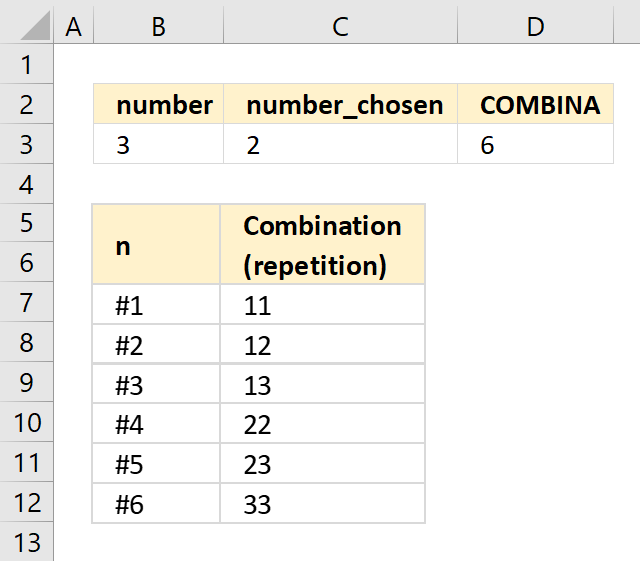
How to comment
How to add a formula to your comment
<code>Insert your formula here.</code>
Convert less than and larger than signs
Use html character entities instead of less than and larger than signs.
< becomes < and > becomes >
How to add VBA code to your comment
[vb 1="vbnet" language=","]
Put your VBA code here.
[/vb]
How to add a picture to your comment:
Upload picture to postimage.org or imgur
Paste image link to your comment.
Contact Oscar
You can contact me through this contact form